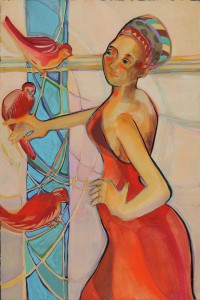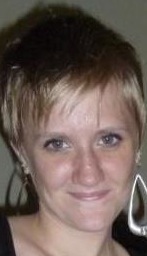Mary Akers: Thank you for agreeing to talk with us today, Katherine. Your story “Crustacean” in our winter issue was ambitious in its setting and subject matter. While it takes place around New York City, Roshani’s mind is stuck in Nepal. Can you talk a little about where you drew your inspiration?
Katherine Russell: Roshani’s character is based on a friend of mine from college. Her life story was one of deep sorrow, loss, and tragedy after tragedy, though she had worked very hard to rise above it. Her childhood in war-torn Nepal weighed on her family a great deal, and even years after leaving her country, she was still mentally working out what she’d seen and been through. I constantly watched her juggle her carefree nature with a deep inner struggle that very few people could understand. I wrote “Crustacean” for her. While Roshani’s experiences aren’t a carbon copy of my friend’s, I drew from her descriptions of Nepal, which were mixed with nostalgia, love, and discontent.
MA: From the beginning, it’s mentioned that Roshani was diagnosed with PTSD from her experiences in Nepal. Can you touch on this subject a little?
KR: I’m always wary of diagnosing characters because it makes it too easy for readers to put them in a box. A part of this literary PTSD diagnosis came from my desire to remain somewhat close to my friend’s true story. The other part is that I wanted to materialize the lasting effects of trauma. Just because we have left a place doesn’t mean there won’t be external cues that haunt us in a new setting. Our homes remain inside of us, and curing ourselves of horrific memories can become even more challenging as time goes on. Because of her PTSD, Roshani is constantly conflicted. Symptoms of Post Traumatic Stress often inspire contradictory feelings on death – there can be an urge to touch it and know it, a need to live free of fear, and a simultaneous desire to detach oneself from the body. Roshani wants to move fast and live recklessly to shake away her anxiety; however, at the same time she wants protection, and she fears for the children in her memories, that they might “unexpectedly fall off the wall, break the growing bones in their bodies, disfigure themselves.” Furthermore, she knows the type of guy Marcus is, but she willingly allows him to play her because she is so desperate for connection.
MA: Can you talk a little bit about the construction of your story – i.e. tense, vantage point, and the intertwining of flashbacks?
KR: It’s definitely hard to incorporate flashbacks without confusing or overwhelming the reader, but my hope is that I’ve done it moderately and successfully. Roshani is caught between making sense of her past and living in the present, which is why I frequently interrupt a present-tense narrative to pull readers back into her memory using physical cues, such as the scar on her cheek. As far as tone goes, I wanted to keep it detached while still giving a full picture of Roshani’s character. The third person present tense carries a very detached tone, and the oceanic /images sprinkled throughout have the same effect.

MA: That leads me to my next question. The crustacean imagery is so subtle in this story and carries the strong theme of loneliness. You tie together the image of an anglerfish’s lantern. In particular, I’m thinking of the line about Roshani “grasping or something warm to hold onto in this metallic water,” and the final image of Roshani curling up with her mother in bed like the shell of a crustacean. What inspired this theme, especially since Nepal is a landlocked country?
A: To me, the ocean is a lonely, dark place, and anyone can relate to the mysterious world within it. I imagine some creatures float in darkness for days before running into another living thing. On land, we can feel similarly when we are alienated from others. Loneliness can push a person to recklessness and even more emotional detachment. As the one line goes, a lonely person hopes to crash “into an ally or a predator, anything that reminds them that they’re not alone down there.”
MA: Yes. I love that. And, finally, if you don’t mind, what does “recovery” mean to you?
A: Recovery has always been a part of my life. I was diagnosed with cystic fibrosis at six months old, and from that point on, I was fighting lung infections with treatments, hospitalizations, and medications. Naturally, as I got older, CF increased in severity, and “recovery” meant something different than others might define it. I knew I would never recover the lung function I was slowly losing; I would never recover time I spent in a hospital bed; and “getting better” didn’t always mean I was back to normal. Then things changed a little. At age 22, I underwent a double lung transplant after weeks of battling pneumonia and rapid weight loss. Before the new lungs, I was laboring for each breath through a ventilator. After the new lungs, recovery meant my body would slowly shed the chest tubes and intravenous lines; I would stand and learn to walk again; and when the ventilator was removed, I would relearn how to inhale and exhale, then watch my lung function gradually rise over the course of several months.
I connect with Roshani through this experience. I have never experienced war or watched someone die up close. However, I intimately know what it means to feel powerless under certain conditions, and extracting oneself from those scary feelings takes more than physical recovery. I remember mentally detaching myself from the bodily trauma I was witnessing every single day during illness and recovery – from little nuisances like heparin injections to worrisome issues like clotting chest tubes. It’s only possible to detach for so long. Eventually, it all catches up to you, and recovering from the post-traumatic stress of it all can take far longer than the physical scars take to heal.
MA: This was wonderful, Katherine. Thanks so much for speaking with us. I so admire your beautiful writing.


Pingback: Crustacean | Rkvry Quarterly Literary Journal
Pingback: “Crustacean” by Katherine Russell | Rkvry Quarterly Literary Journal